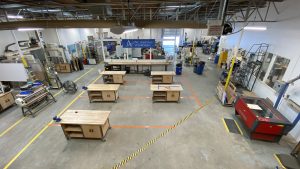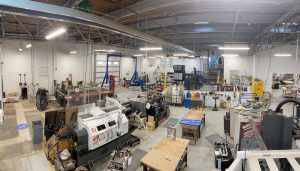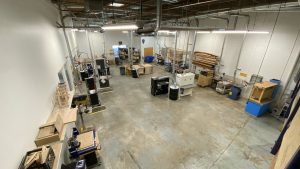Welcome to STEAM Studio!
Science, Technology, Engineering, Art, and Math (STEAM) converge in this educational space at the River Arts Makers Place (RAMP), engaging the next generation of makers, engineers, artists, and entrepreneurs, who work side-by-side with faculty and staff experts experienced in all facets of the creative process.
UNC Asheville’s STEAM Studio brings together innovation, design, and fabrication with equipment for 3D modeling and printing, as well as water jet, laser, and plasma cutters. It features multiple forms of metal fabrication equipment, a state-of-the-art woodworking facility, and spaces designed specifically to support cross-disciplinary learning through collaborations.
Developed by UNC Asheville, the state’s designated public liberal arts university and a national leader in making an impact, STEAM Studio connects the campus to the creative community of Asheville.
Who We Are
STEAM was founded by a collective of artists and engineers at UNCA who saw value in collaboration, found inspiration in each other, and the limitless potential of making-based education to elevate the student experience and create positive change in our communities.
We support students across disciplines who are curious, thoughtful, and engaged. Our students are encouraged to think critically about problems, apply empathy in the development of solutions, and craft quality objects. We believe that everyone, regardless of discipline, has something to offer. Whether it is through knowledge, skills, perspective, or resources, we all have value and it will take our collective effort to navigate the challenges of our time. Check out our current Faculty and Staff here
What We Do
STEAM Studio has three main areas of focus:
Academic Classes:
STEAM hosts curricular classes from multiple departments including Art, Engineering, Music, Ancient Mediterranean Studies, and Liberal Arts. We continuously engage with faculty to develop making-based experiences for students from all disciplines.
Community Outreach:
STEAM Studio’s SkillSet program offers community-based classes for youth and adults in the studio and off-site where UNCA students can gain experience working as curriculum designers, instructors, and facilitators while engaging the wider Western North Carolina community in creative problem solving. We also offer informal classes for the UNCA community through our Fab Night series. These classes offer students, faculty, and staff bite-sized projects focused on a different material and tool each time.
Special Projects:
UNCA students can gain real-world experience working in collaborative teams with various artists, entrepreneurs, and institutions to design, develop, and fabricate special projects. Past examples include Mel Chin’s “Wake” in Times Square and the North Carolina Arboretum’s animatronic “Storytime in Woodland Cove”. We connect these projects to our academic classes and community outreach efforts whenever possible.

STEAM Studio’s Three Main Areas of Focus
Where We Do It
More than a container for tools and equipment, STEAM is a space for radical collaboration and the manifestation of big visions. Our 12,000 sq ft facility is located a short distance from campus at the River Arts Makers Place (RAMP), 821 Riverside Dr. Suite 140. The Studio is comprised of a state-of-the-art wood shop, machine shop, welding fabrication bay, 3,800 sq ft configurable workspace, and a mezzanine-level computer lab/classroom. We have water jet cutting, CNC machining, CNC routers, laser cutting, and 3D printing in addition to a myriad of hand tools and standard shop machines. See drone video of the studio and facility details in the links below:
Why STEAM?
STEAM is a nationally-known movement that integrates science, technology, engineering, art, and math to create new technologies and solutions to modern problems. Integrating the arts into the traditional STEM model (science, technology, engineering, math) makes new technologies more user-centered, and allows for real-world applications of art and design. While we recognize that the STEAM acronym is imperfect, we see the integration of diverse disciplines as a model for collaborative problem-solving and systems thinking. We see STEAM as more than the five disciplines that form the acronym. For example, we include the social sciences with physics, chemistry, and biology; performing arts and humanities with art; history with technology and its rich understanding of the tool and material developments that have brought us to the modern day. We see STEAM as encompassing and embracing all disciplines through our common existence in a designed world.
Innovation
Natural innovations can occur when art and science come together when form and function meet. At STEAM Studio we can nurture such collaboration that will manifest new solutions to real-world problems.
The spaces at STEAM Studio foster cross-disciplinary teaching, learning, and collaboration with local industry partners for solutions in the design of assistive device technologies, practical product design, and STEAM curriculum for K-12.
Technology is integrated into our curriculums with the use of computer-aided design, electronics, state-of-the-art machinery, and kinetics right alongside hand-working skills and craftsmanship.
Collaboration
STEAM Studio is a collaborative making space. We use the term making space as opposed to makerspace to emphasize the process rather than the individual. We recognize the role of the individual in the process and the importance of each contribution. But when we focus on the process, we start to value the intangible contribution of the individual to the community. Collaboration is a critical 21st century skill. It’s not always easy, but through the challenges, we all become better.
Real-World Preparation
STEAM Studio nurtures skill sets that employers want. Our students develop an understanding of the world around them through the rigorous liberal arts curriculum in their academic programs. This combined with the technical and creative skills honed at STEAM Studio empowers students to be innovative change-makers.
STEAM Studio also hosts visiting makers and scholars who work alongside our students. Our robust facility supports senior exhibitions in art and senior projects in engineering while providing support for in-depth undergraduate research. Student workers participate in real-world projects serving local clients in the design and development of prototypes and small batch production.



